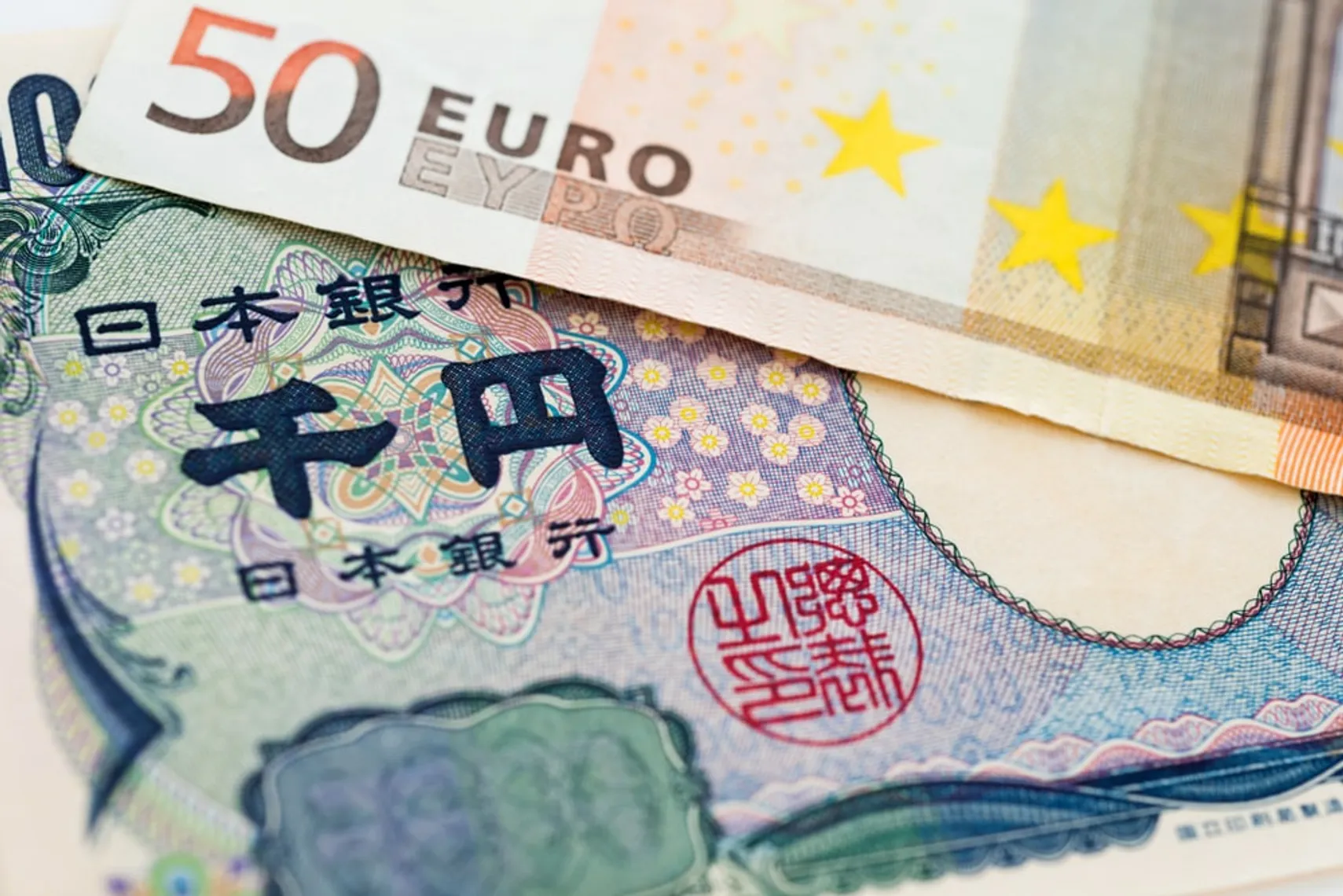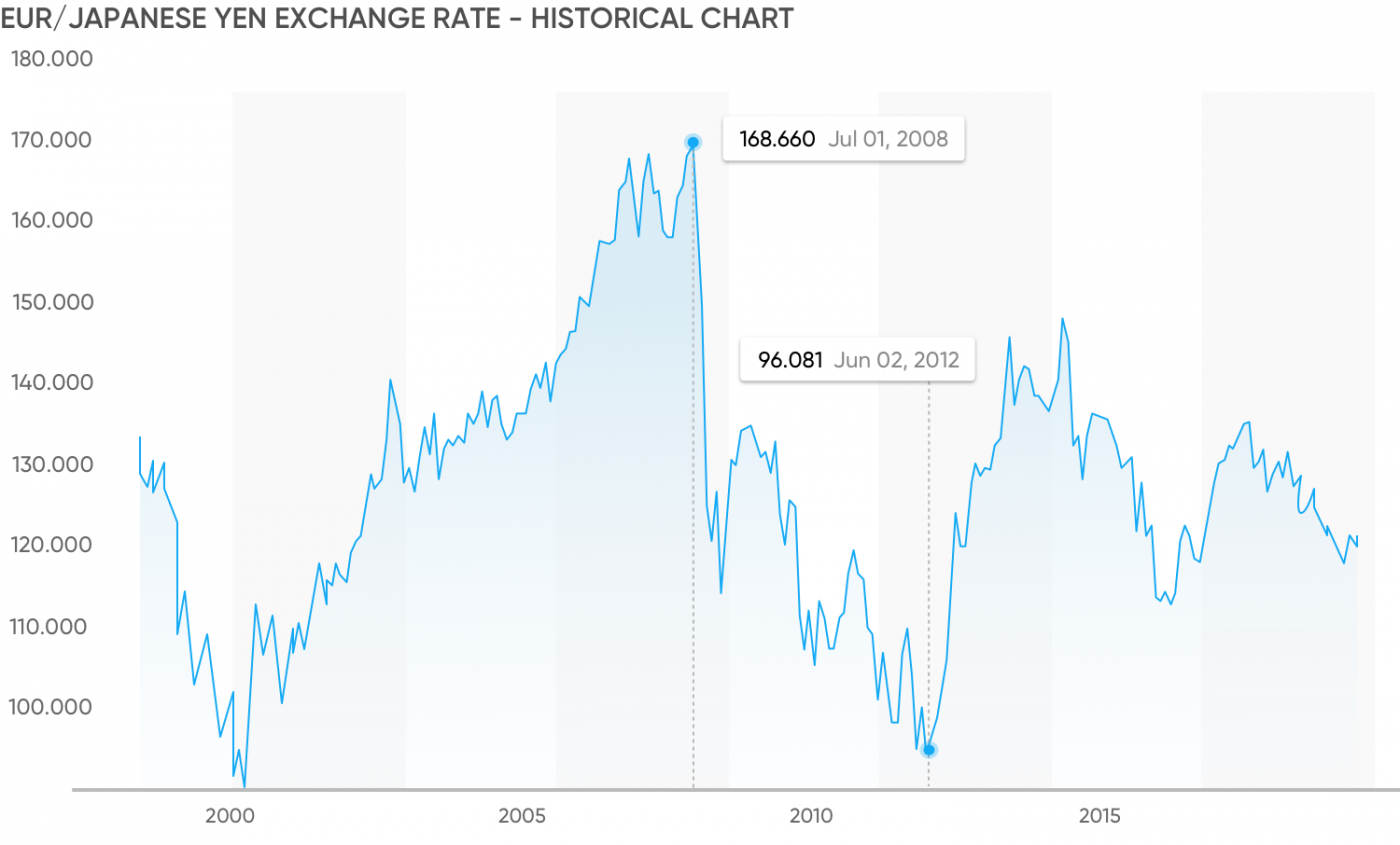Your guide to trading the EUR/JPY Forex pair

Why is EUR/JPY important to traders?
EUR/JPY represents around 3% of global forex transactions and often ranks among the most traded currency pairs in the world.
Learn what the EUR/JPY currency pair means for investors and CFD traders in the forex market.
Trade [120]+ forex CFDs with Capital.com.
EUR/JPY trading hours
Theoretically you can trade forex CFDs 24 hours a day, five days per week, but there are times when the EUR/JPY currency pair is more active.
EUR/JPY is generally busy during the London and Tokyo trading sessions, particularly between 7am and 4pm (UTC), with increased volatility often observed when both sessions overlap between 7am and 9am (UTC).
EUR JPY history
The Japanese yen is one of the most widely traded currencies in the world, and the third most widely held reserve currency (behind the US dollar and the euro).
JPY was officially adopted by the Meiji government in 1871. Since then, the yen’s value has fluctuated significantly, shaped by major economic developments and global financial events, with notable appreciation in the latter half of the 20th century.
The euro was only conceived in the 20th century, and physical notes and coins for the euro were not released until 2002. Now the euro is the currency for many European countries.
Although the euro is a relatively new currency, the euro has had its fair share of ups and downs. Political and economic events since its launch, including the Eurozone debt crisis, are just some of the reasons for euro volatility.

Past performance is not a reliable indicator of future results.
Factors influencing the euro-yen rate
The EUR/JPY rate can be influenced by factors affecting either currency, such as economic data releases, central bank policy, and interest rate changes – as well as broader market-moving events.
Role of EUR
Like most modern currencies, the major factors which influence the movement of euro prices are mainly economic, political, and financial. Many of the ways in which the euro is affected will already be familiar to people who have a basic knowledge of how traders try to determine which way prices of currencies like the euro will move.
For example, the European Central Bank's (ECB) monetary policy decisions and communications form the backbone of many traders' decisions regarding the euro. These announcements can affect the fluctuation of euro rates – keen investors and CFD traders are often quick to scour these details as soon as they are released in an effort to find out more about what direction the euro could be heading.
Economically, news releases surrounding inflation, GDP, and employment can play a huge part in the oscillation of euro rates. These figures are freely available and provide a valuable insight into the health of Europe's economy and the direction in which euro prices could go.
Role of JPY
The economy of Japan has a few more factors in play that can affect the rate of their currency. As always, the general health of the economy will play a massive part, with the high rate of import and export trading in Japan helping to boost or weigh on prices, depending on the state of the industry.
One of the influencing factors that you're less likely to find in other countries is, surprisingly, Japan’s geographic location on the Pacific Ring of Fire, which increases its exposure to natural disasters. As a result, events like earthquakes and typhoons can influence the currency’s value, although the impact can vary depending on market expectations and the scale of the event.
The government of Japan often utilises economic initiatives in an effort to bolster the economy. As a result, many traders and investors pay extremely close attention to interest rates and government interventions from financial institutions such as the Bank of Japan (BOJ). Another regular factor that traders watch out for is the details within data reports such as the quarterly Tankan Report, the Tokyo Area CPI, and the aforementioned interest rate decisions of the BOJ. These help to determine various financial paths that the yen may follow.
How to trade EUR/JPY
You can trade EUR/JPY either through spot forex trading or by using a contract for difference (CFD) on the currency pair to speculate on price movements.
A CFD is a financial contract between a broker and an investor, where one party agrees to pay the other the change in value for a security. This means you can speculate on the price difference of the underlying asset from the opening to the closing of the contract, without taking ownership of the actual currency pair.
You could either open a long position (buy) if you anticipate the price to rise, or a short position (sell) if you expect the market price to fall.
|
CFDs are complex instruments and come with a high risk of losing money rapidly due to leverage. Consider whether you understand how CFDs work and whether you can afford to take the high risk of losing your money. |
Past performance is not a reliable indicator of future results.
Why trade EUR/JPY CFD with Capital.com?
Advanced technology – our news feed provides you with personalised and unique content depending on your preferences, the SmartFeed includes analysis and educational material to help inform your decisions – recommending videos, articles, and news to sharpen your trading strategy.
Trade on margin – CFDs are traded on margin (up to 20:1 for non-major forex pair CFDs such as EUR/JPY, leverage may vary depending on jurisdiction). Leverage beyond 1:1 magnifies both potential gains and potential losses.
Contracts for difference (CFDs) – by trading EUR/JPY CFDs, you speculate on whether its price will rise or fall. You can go short or long, set stop-loss* and take-profit orders to manage risk, and apply trading scenarios that align with your objectives.
Sharpen your analysis – stay informed about the latest moves with our [100]+ technical indicators – including chart-drawing tools and more. Available on desktop, iOS, and Android.
We prioritise your safety – Capital.com puts a special emphasis on safety. Licensed by the FCA, MENA, ASIC, SCB, and CySEC, adhering to local regulations while prioritising our clients’ data security. You can submit withdrawal requests 24/7 – with funds stored in segregated accounts in accordance with regulatory requirements.
*Stop-loss orders aren’t guaranteed. Guaranteed stop-loss orders (GSLOs) incur a fee once activated.
If you want to master forex trading try our step-by-step forex course and explore potential profits and losses on your forex CFD trades with our free forex profit calculator.
FAQ
How is forex different to other markets?
Given there is no central exchange and trading is decentralised, involving a wide range of participants, forex trading volumes can be significant compared to many other markets. This may result in competitive bid-ask spreads, which can potentially lower trading costs.
What is it that I'm buying and selling in forex?
When you trade CFDs on EUR/JPY, you don’t actually take ownership of either the euro or the yen. Instead, you are entering into a contract with your broker to speculate on whether the price of the euro will strengthen or weaken against the Japanese yen. If you believe the euro will rise against the yen, you take a long position; if you think the yen will strengthen, you take a short position. Your profit or loss depends on how the price moves, rather than any physical exchange of currencies.
I keep seeing the word 'pip,' what does that mean?
A pip is the smallest increment of trade in the foreign exchange market. It stands for 'percentage in point'. EUR/JPY is quoted to two decimal points, so a pip is just the lowest amount that can possibly be added to (or subtracted from) this figure.
Does Capital.com earn commission in forex trading?
The simple answer is 'no' – at Capital.com, you only pay the spread – which is the difference between the bid and ask prices – along with any applicable overnight funding charges. This differs from some brokers, who may charge a separate commission on each trade.